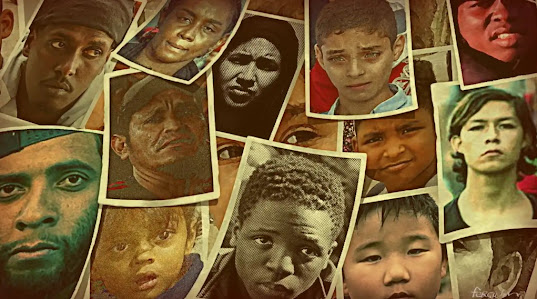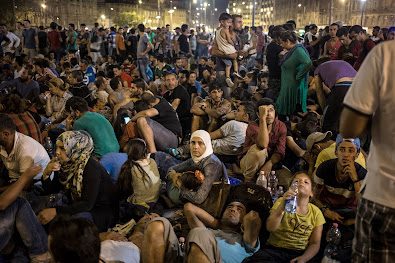"A massive surge of migrants has sought to cross from Mexico into the U.S. on Thursday, straining resources and patience on both sides of the border before the pandemic-era measure known as Title 42 ended at midnight Eastern time.....The migrant surge has overwhelmed the Border Patrol, leading agents to release large numbers of migrants into border cities to reduce overcrowding in detention centers. and has sent cities from El Paso, Texas to New York struggling to prepare for new arrivals.. Homeland Security Secretary Alejandro Mayorkas said Thursday he expected Border Patrol facilities to be “very crowded” following the end of Title 42, while insisting the administration will “meet the moment.” And he warned migrants not to cross illegally. “I want to be very clear: Our borders are not open.... Do not risk your life and your life savings only to be removed from the United States "
The above account in last Friday's Wall Street Journal (p. A3), of what's occurring on our border, was a reminder of what we beheld 8 years ago in eastern Europe. It was on the evening of Sept. 2nd, 2015, that we learned that thousands of migrants - mainly Syrian refugees - were flooding into Keleti train station in Budapest. The grim scenes televised over the BBC into our hotel room were not encouraging, with thousands occupying the station - and mats, people spread all over. The word "bedlam" perhaps best described what we beheld.
After grabbing an early breakfast on Sept. 3rd, we went to the front desk to checkout, hoping to arrive at Keleti by no later than 9.55 a.m. to avoid any delays or confusion in getting to Vienna, Austria. But Lili, the amiable hotel front desk manager, informed us that the station has been totally shut down - no trains running at all. Period. The existing chaos featured tens of thousands of migrants attempting to board trains to Western Europe on their own, forced the authorities' decision.
The end result of that mass panic migration saw Angela Merkel's Germany taking in nearly 1 million immigrants, triggering enormous social and political impacts - not only in Germany but across Europe. To sum up one major political consequence: Merkel's right centrist CDU part was on the ropes, splitting with coalition partner Horst Seehofer over the migrant influx and its effects on Germany.
Here in the U.S. the migrant surge has overwhelmed the Border Patrol, leading agents to release large numbers of migrants into border cities to reduce overcrowding at detention centers—and has sent cities from El Paso, Texas, to New York struggling to prepare for new arrivals.
But is this peculiar to the U.S.? No. As Gideon Rachman also noted in his recent FT piece (May 7, 'Migration Will Drive Western Politics For Decades') Italy is currently being inundated with migrants crossing the Mediterranean from Africa and PM Giorgia Meloni has no clue what to do or how to stop the flood. As for the magnitude of that migrant flood, in the past 4 years some "600,000 migrants have arrived in a country of just over 60 million people". Further we read:
"The largest source of these migrants making the perilous sea crossing to Italy is Nigeria whose population has risen from 45 million in 1960 to 187 m today and is projected to hit 450 m by 2050. The European Commission has projected that Nigeria's population alone could be bigger than the whole EU by 2060."
Apart from the political instability let's note how the human numbers
have changed in those decades cited by Rachman and others. For example, 3.9 billion populated the
planet in 1973, compared to 4.4 billion in 1980. But by 1990 it
was 5.2 billion.
All other things being relatively equal one would expect an increase in
migrants as well as asylum seekers given the added population, as well as enhanced climate change and political instability. Flash forward
now to 2015, the year of the great influx of Syrian and other refugees into
Europe and we find the world at 7.4
billion - or 2.2
billion more people than in 1990. Why wouldn't there be vastly more
migrants, asylum seekers?
The false assumption of global planners is that nations ought to remain in
population stasis or equilibrium and hence not see a third or more of their populations
fleeing to 'greener pastures.' But we know this isn't the case, and any
nation can devolve into civil war or other instability if the right confluence
of factors emerges, such as they did in Syria and more recently Haiti, Venezuela, Guatemala and sundry other nations. Rachman again (ibid.):
"The poverty and violence prompting many Central Americans to make the hazardous journey to the U.S.will not easily be eradicated." But, he adds, they will provide powerful ammunition to the demagogues like Trump and Orban,
Let us also process the
U.S. has had a major role in a lot of the incipient political instability over
the years, especially in Central America. For example, in 1954, the U.S.
overthrew the democratically elected Jacobo Arbenz in Guatemala, leading to
200,000 civilian deaths and endless strife. Arbenz sought to
nationalize the vast banana plantations of United Fruit – but was ousted
in a U.S. engineered coup (“Operation PBSUCCESS”) in 1954. See :
http://www.gwu.edu/~nsarchiv/NSAEBB/NSAEBB4/ That instability has never abated, only gotten worse as gangs of thugs and political weakness have wrought havoc on a hapless, destitute population.
The U.S. also, in 1977, backed the bloodthirsty military regime in El Salvador,
leading to 70,000 civilians massacred and paving the way for the internal
strife and drug linked gangs operating with impunity now. Then starting in
1981, the Reagan administration trained and funded the 'Contras" in
Nicaragua, leading to 30,000 civilian deaths and much civil upheaval.
In many ways, therefore, the U.S. could be said to have a direct
responsibility to care for those fleeing the violence in Salvador,
Nicaragua and Guatemala.
Will things get worse, and mass migrations vastly increase? Of course, because
the most vulnerable nations are seeing the largest population increases,
combined with severe resource depletion, including food crops (much of this
from climate change). Overpopulation in the African continent is
especially worrisome, as it ought to be to Europeans who fret over the
numbers of asylum seekers liable to drown in risky crossings.
In the WSJ piece, 'Humans Lions Struggle to Co-Exist', Aug.
8-9, 2015, p. A7, it was noted:
"Africa's human population is
the fastest growing in the world. In roughly the same period as the lion
decline (42 percent over 21 years), the number of Africans has doubled to
nearly 1.2 billion people. The population will double again to 2.5 billion by
2050 according to the United Nations."
In fact, short of a global catastrophe - say like an Avian flu pandemic or
airborne Ebola - it is projected to reach 5.8 billion by 2100. That means
nearly 1 of every 2 people on Earth will be African. Where will the
resources be to support them? The jobs? The water? The life quality?
Even if those billions are fortunate to have wise leaders with the best
intentions, resource scarcity - including from enhanced climate change - is
likely to defeat them, certainly without vast economic support.
Fact is, that the current global population growth is unsustainable and
means either vast numbers will perish, likely of disease, war or famine - or
they will do everything they can to go to places with greater opportunity and
resources- like Europe and the U.S. In order not to perish the teeming millions will have no other choice than to flee their own borders and head for perceived more stable nations, like the UK, Canada and the U.S. But is it a foregone conclusion that this must be a negative? An article 4 days ago in the Wall Street Journal suggests it doesn't have to be - if the U.S. followed the plan of other affluent nations, i.e.
Migration to affluent countries is at record highs, and some nations short of workers are overcoming political opposition to open their borders even wider, hoping to fill jobs and ease inflation. Government actions to attract foreign nationals for skilled and unskilled jobs have spread from Germany to Japan and include countries with longtime immigration restrictions and some with a populist antipathy to streams of foreign workers. The U.S. remains an outlier. Hundreds of thousands of migrant workers have arrived through back channels, but the country isn’t openly welcoming more legal workers, despite the tight labor market.
That hesitancy carries economic costs, including persistent worker shortages and wage inflation, according to economists and some U.S. officials. Unemployment is at a record low 4.8% across the 38 largely affluent countries that make up the Organization for Economic Cooperation and Development. These and other nations report a long list of open positions from truck drivers to baggage handlers to miners.
We need bold and rational strategy to meet the mass migrations to come and we need to have it in place now. The problem is that too much emotion infuses the immigration issue and too few analytical solutions.
See Also:
One Way To Relieve Supply Chain Labor Shortages: Allow Foreign Workers In As Permanent Residents
And:
Again, Trump- Incepted Immigrant Labor Shortage Is Triggering Most of 'Kitchen Table' Inflation


No comments:
Post a Comment